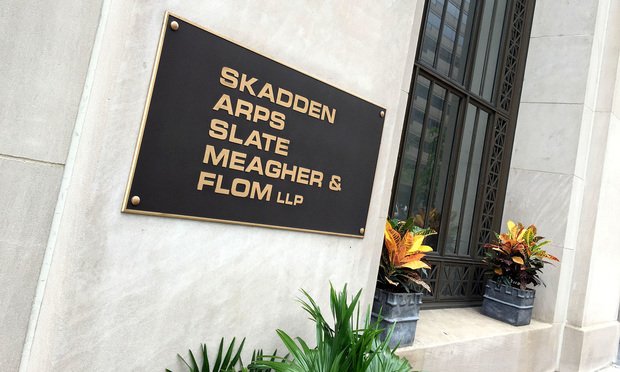Daily Dicta: Well, At Least Skadden Had a Good Week
The firm's results last week show why clients keep hiring them.
March 30, 2020 at 01:46 AM
7 minute read

Seven wins in five days. That was the impressive tally last week for litigators at Skadden, Arps, Slate, Meagher & Flom, who chalked up victories in three securities fraud cases, two antitrust fights, one personal injury class action and one non-compete agreement challenge.
Defending against securities class actions is something of a sweet spot for Skadden. Per Lex Machina statistics, the firm was the No. 1 choice as counsel for nationwide federal securities cases filed in 2019. Of the 2,009 cases filed last year, Skadden was tapped as defense counsel in 65 of them. The firm also served as plaintiffs counsel in one case and as counsel to third parties in four more.
(In case you're wondering: Latham & Watkins and Wilson Sonsini were second, representing defendants in 58 cases; Morgan, Lewis & Bockius was tapped as defense counsel in 35 cases, and Cooley rounded out the top five with 34.)
The trend has continued in 2020. So far, there have been 480 federal securities cases filed, and Skadden has gotten the nod as defense counsel in nine of them, according to Lex Machina. Greenberg Traurig is in second place with eight.
 The firm's results last week show why clients keep hiring them.
The firm's results last week show why clients keep hiring them.
On Friday, a Skadden team led by Jim Carroll and Alisha Nanda in Boston and Scott Musoff in New York won dismissal of a securities fraud class action on behalf of Intercept Pharmaceuticals Inc.
The biopharmaceutical company was sued in the Southern District of New York by shareholders who claimed Intercept made material misrepresentations and omissions about its drug Ocaliva. The medication is used to treat patients with a rare liver disease called primary biliary cholangitis.
Of about 3,000 patients who took the drug in a one-year period, 27 experienced a serious injury or death—though almost half of the cases were because doctors prescribed too high of a dose. In 2017, the FDA issued a safety alert warning that Ocaliva was "being incorrectly dosed in some patients with moderate to severe decreases in liver function." The company's share price tumbled and plaintiffs lawyers from Faruqi & Faruqi filed suit.
But U.S. District Judge Lewis Kaplan on March 27 tossed the case, noting that "To the extent that there were concerns about the vulnerabilities of late-stage patients, it bears repeating that these patients had compromised livers and already were quite sick."
Moreover, Kaplan wrote, the plaintiffs' argument "ignores the fact that physicians—not pharmaceutical companies—prescribe prescription drugs… And there are no allegations that Intercept disseminated incorrect dosing instructions or that Ocaliva's label was unclear as to the recommended dose for late-stage patients."
Musoff, Carroll and Nanda, along with partner Michael Hines, also scored a second win last week, this time for Alnylam Pharmaceuticals Inc..
The biotech company and some of its officers were sued in the District of Massachusetts for allegedly making false or misleading statements about the efficacy and marketability of a new drug to treat a rare condition known as hereditary ATTR amyloidosis. The gene mutation causes a potentially harmful build-up of certain proteins in the body's nerves and organs.
But U.S. District Judge Nathaniel Gorton rejected claims that the defendants mischaracterized less-than-optimal clinical trial results. "Although the FDA interpreted trial results differently and defendants' opinions may have been erroneous, those facts alone do not render the statements fraudulent or misleading," he wrote on March 23.
Nor was the judge persuaded that any of the individual defendants, who sold $66 million worth of Alnylam stock during the class period, sought to defraud investors for personal gain. The plaintiffs, represented by Pomerantz and Andrews DeValerio, unsuccessfully argued that the sales were executed before negative news about the clinical trial reached the market.
"Plaintiffs do not provide the necessary evidence or context surrounding the trades that would allow the court to draw the strong inference required," Gorton wrote.
Musoff bagged his third win last week when he and Jay Kasner, who heads Skadden's securities litigation practice, prevailed before the U.S. Court of Appeals for the Second Circuit.
They represented the management and directors of Republic Airways, which operates flights on behalf of Delta, American and United. The regional airline hit turbulence when it faced a shortage of pilots and struggled to cover the flights it had committed to.
In 2016, Republic filed for Chapter 11 bankruptcy protection, which allowed it to negotiate new arrangements with its airline partners. This included a $170 million payment to Delta (represented by Davis Polk), which had sued Republic for breach of contract for failing to maintain adequate pilot staffing levels.
Two distressed debt funds (represented by Kessler Topaz Meltzer & Check) that had invested in Republic objected. They argued that Delta's unsecured claim was an overpayment, especially since Republic previously asserted Delta's litigation was meritless.
But Second Circuit judges Gerald Lynch, Denny Chin and Paul Engelmayer were not impressed. "[P]laintiffs failed to allege how Republicʹs reorganization plan caused them any economic injury that is not wholly speculative," they wrote on March 23 in a decision issued just over a week after oral arguments.
Skadden's other wins last week included a milestone victory before the U.S. Court of Appeals for the Seventh Circuit Court in a 17-year old antitrust lawsuit filed by U.S. Futures Exchange against the Chicago Board of Trade and CME, now both a part of CME group.
On behalf of CME, Skadden partners Albert Hogan III, William Ridgway and Gretchen Wolf and counsel Jonathan Marcus convinced the appellate panel to affirm the district court's grant of summary judgment.
Also, Kasner plus partners Karen Hoffman Lent and Mark Young knocked out an antitrust class action in the Southern District of New York against client Citigroup, Inc. and three affiliates. The lawsuit alleged a conspiracy between several major banks to restrain trade in the U.S. dollar-denominated market for supranational, sub-sovereign and agency bonds in violation of Section 1 of the Sherman Act.
But wait, there's more: Musoff along with Julie Cohen, Jim Brown, Michael Restey, Chris Fredmonski, Mikal Davis-West, Kevin Kroyer, Andrew Sabintsev and Sahng-Ah Yoo won a bench trial before U.S. District Judge Victor Marrero in the Southern District of New York.
The team secured a judgment on all counts on behalf of oncologist Dr. Kenneth Carson in a lawsuit brought by his former employer, Flatiron Health Inc., to enforce a noncompete provision in the doctor's employment agreement. Flatiron sought to prevent Dr. Carson from beginning work at Skadden client Tempus Labs Inc.
And finally, the U.S. Court of Appeals for the First Circuit affirmed the dismissal of a putative nationwide class action filed against eClinicalWorks. The estates of two patients whose medical records supposedly contained inaccuracies as a result of alleged glitches in eCW's electronic healthcare records software sued the company. The claims were dismissed based on lack of Article III standing—a win for a Skadden team led by Jessica Miller, Geoff Wyatt and James Carroll.
"We are proud of these outstanding litigation results, spanning a variety of practices and led by partners across numerous Skadden offices," Kasner said. "Our dedication to understanding our clients' business goals and objectives—which is particularly critical during the current challenging environment—enables us to achieve successful outcomes on behalf of companies of all types and sizes and their officers and directors."
This content has been archived. It is available through our partners, LexisNexis® and Bloomberg Law.
To view this content, please continue to their sites.
Not a Lexis Subscriber?
Subscribe Now
Not a Bloomberg Law Subscriber?
Subscribe Now
NOT FOR REPRINT
© 2025 ALM Global, LLC, All Rights Reserved. Request academic re-use from www.copyright.com. All other uses, submit a request to [email protected]. For more information visit Asset & Logo Licensing.
You Might Like
View All
Firms Come Out of the Gate With High-Profile Litigation Hires in 2025

2024 Marked Growth On Top of Growth for Law Firm Litigation Practices. Is a Cooldown in the Offing for 2025?

Big Company Insiders See Technology-Related Disputes Teed Up for 2025

Litigation Leaders: Jason Leckerman of Ballard Spahr on Growing the Department by a Third Via Merger with Lane Powell
Law Firms Mentioned
Trending Stories
Who Got The Work
J. Brugh Lower of Gibbons has entered an appearance for industrial equipment supplier Devco Corporation in a pending trademark infringement lawsuit. The suit, accusing the defendant of selling knock-off Graco products, was filed Dec. 18 in New Jersey District Court by Rivkin Radler on behalf of Graco Inc. and Graco Minnesota. The case, assigned to U.S. District Judge Zahid N. Quraishi, is 3:24-cv-11294, Graco Inc. et al v. Devco Corporation.
Who Got The Work
Rebecca Maller-Stein and Kent A. Yalowitz of Arnold & Porter Kaye Scholer have entered their appearances for Hanaco Venture Capital and its executives, Lior Prosor and David Frankel, in a pending securities lawsuit. The action, filed on Dec. 24 in New York Southern District Court by Zell, Aron & Co. on behalf of Goldeneye Advisors, accuses the defendants of negligently and fraudulently managing the plaintiff's $1 million investment. The case, assigned to U.S. District Judge Vernon S. Broderick, is 1:24-cv-09918, Goldeneye Advisors, LLC v. Hanaco Venture Capital, Ltd. et al.
Who Got The Work
Attorneys from A&O Shearman has stepped in as defense counsel for Toronto-Dominion Bank and other defendants in a pending securities class action. The suit, filed Dec. 11 in New York Southern District Court by Bleichmar Fonti & Auld, accuses the defendants of concealing the bank's 'pervasive' deficiencies in regards to its compliance with the Bank Secrecy Act and the quality of its anti-money laundering controls. The case, assigned to U.S. District Judge Arun Subramanian, is 1:24-cv-09445, Gonzalez v. The Toronto-Dominion Bank et al.
Who Got The Work
Crown Castle International, a Pennsylvania company providing shared communications infrastructure, has turned to Luke D. Wolf of Gordon Rees Scully Mansukhani to fend off a pending breach-of-contract lawsuit. The court action, filed Nov. 25 in Michigan Eastern District Court by Hooper Hathaway PC on behalf of The Town Residences LLC, accuses Crown Castle of failing to transfer approximately $30,000 in utility payments from T-Mobile in breach of a roof-top lease and assignment agreement. The case, assigned to U.S. District Judge Susan K. Declercq, is 2:24-cv-13131, The Town Residences LLC v. T-Mobile US, Inc. et al.
Who Got The Work
Wilfred P. Coronato and Daniel M. Schwartz of McCarter & English have stepped in as defense counsel to Electrolux Home Products Inc. in a pending product liability lawsuit. The court action, filed Nov. 26 in New York Eastern District Court by Poulos Lopiccolo PC and Nagel Rice LLP on behalf of David Stern, alleges that the defendant's refrigerators’ drawers and shelving repeatedly break and fall apart within months after purchase. The case, assigned to U.S. District Judge Joan M. Azrack, is 2:24-cv-08204, Stern v. Electrolux Home Products, Inc.
Featured Firms
Law Offices of Gary Martin Hays & Associates, P.C.
(470) 294-1674
Law Offices of Mark E. Salomone
(857) 444-6468
Smith & Hassler
(713) 739-1250






